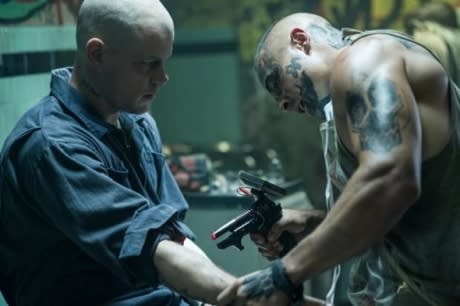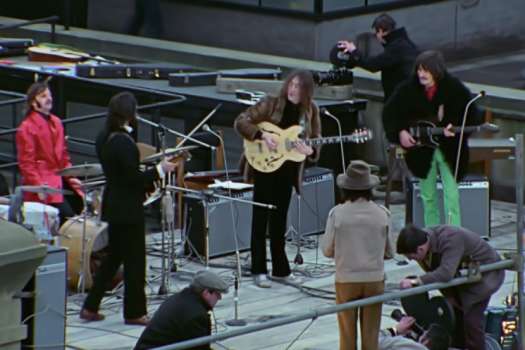When Neill Blomkamp emerged, seemingly fully formed, as a talented, visionary director with his 2009 debut, District 9, he heralded the arrival of a new and very necessary voice to sci-fi filmmaking. By tossing aside superhero tropes and far-flung fantasy worlds, rooting his stories in recognizable realities (poverty, decay, Earth), he defibrillated the seemingly inert role that sci-fi at its best has always played: as an allegory for the human condition. He did so on a relatively minimal budget, without a star and with a film set in South Africa, which is less familiar to moviegoers than Mars or even Asgard.
Now armed with a bigger budget and flanked by Matt Damon and Jodie Foster, but with a much bigger spotlight pointed in his direction, Blomkamp has disappointingly retreated to the well-trod path in the middle of the metaphorical road.
In mid-22nd century Earth, the world has gone to shit: environmental devastation, extreme poverty, wild overpopulation and oppressive political forces have brought the vast majority of the planet's inhabitants to a state of destitution. High above them in Elysium (an orbiting station large enough to be visible from the planet's surface) float the one percent. There, serene garden parties are attended by the beautiful upper crust, all gleaming white teeth, miraculous instant health care and education in several languages — it's the ultimate gated community, with the vast emptiness of space a most effective fence. Below, it's Children of Men; above, it's the spaceship from Wall-E, if they weeded out the fatties in favour of supermodels.
Max (Damon) is an ex-con turned factory worker who, after being injured in an industrial accident, gets mad as hell about the quality of life disparity and decides to get in touch with his criminal buddies to strike back for justice. Speaking of justice, Jodie Foster (as Delacort, the Minister of Defense for Elysium) looks to mete out some of her own, in the form of taking down some of her too-liberal compatriots who don't like her shooting first and asking questions later when it comes to any space vehicle approaching Elysium's orbit.
This Rumsfeld in Louboutins is taking no political prisoners. Delacort's dirty work on Earth is carried out by assassin Kruger (Blomkamp's childhood buddy and District 9 star Sharlto Copley); she sends him after Max as soon as the first signs of rebellion cross her radar.
Max gets his half-machine on, arming himself with some junkie cyborg tech and sets out with a sick child in need of Elysium's miracle care in tow, pursued by Kruger, a hyper-violent cog in this broken wheel of haves and have-nots. This is where Blomkamp fans start to itch — now that this fairly obvious and really superficial set-up is established — to see when the spin comes. You know, that moment that turns this too-easy-by-half metaphor into something deeper and more complex than an Upton Sinclair novel? But that turn never comes.
Elysium plays out as a reasonably well-executed, if painfully obvious, morality play about the powerless poor trying to snatch crumbs falling from the marble tables of the super-rich. Well-executed action and good performances from Damon, Foster and Copley can't hide the fact that there's so little there.
The disappointment of Blomkamp finally getting a chance at a huge stage and discovering he has nothing to say when he reaches the microphone is palpable.
(Sony)Now armed with a bigger budget and flanked by Matt Damon and Jodie Foster, but with a much bigger spotlight pointed in his direction, Blomkamp has disappointingly retreated to the well-trod path in the middle of the metaphorical road.
In mid-22nd century Earth, the world has gone to shit: environmental devastation, extreme poverty, wild overpopulation and oppressive political forces have brought the vast majority of the planet's inhabitants to a state of destitution. High above them in Elysium (an orbiting station large enough to be visible from the planet's surface) float the one percent. There, serene garden parties are attended by the beautiful upper crust, all gleaming white teeth, miraculous instant health care and education in several languages — it's the ultimate gated community, with the vast emptiness of space a most effective fence. Below, it's Children of Men; above, it's the spaceship from Wall-E, if they weeded out the fatties in favour of supermodels.
Max (Damon) is an ex-con turned factory worker who, after being injured in an industrial accident, gets mad as hell about the quality of life disparity and decides to get in touch with his criminal buddies to strike back for justice. Speaking of justice, Jodie Foster (as Delacort, the Minister of Defense for Elysium) looks to mete out some of her own, in the form of taking down some of her too-liberal compatriots who don't like her shooting first and asking questions later when it comes to any space vehicle approaching Elysium's orbit.
This Rumsfeld in Louboutins is taking no political prisoners. Delacort's dirty work on Earth is carried out by assassin Kruger (Blomkamp's childhood buddy and District 9 star Sharlto Copley); she sends him after Max as soon as the first signs of rebellion cross her radar.
Max gets his half-machine on, arming himself with some junkie cyborg tech and sets out with a sick child in need of Elysium's miracle care in tow, pursued by Kruger, a hyper-violent cog in this broken wheel of haves and have-nots. This is where Blomkamp fans start to itch — now that this fairly obvious and really superficial set-up is established — to see when the spin comes. You know, that moment that turns this too-easy-by-half metaphor into something deeper and more complex than an Upton Sinclair novel? But that turn never comes.
Elysium plays out as a reasonably well-executed, if painfully obvious, morality play about the powerless poor trying to snatch crumbs falling from the marble tables of the super-rich. Well-executed action and good performances from Damon, Foster and Copley can't hide the fact that there's so little there.
The disappointment of Blomkamp finally getting a chance at a huge stage and discovering he has nothing to say when he reaches the microphone is palpable.




